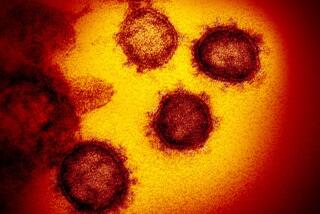Developments in Brief : UCSF Joins With Biotech Company to Seek Vaccine Against Chlamydia
Scientists at UC San Francisco and the Chiron Corp. have taken the first step in development of a vaccine against chlamydia, the most common sexually transmitted disease in this country and a leading cause of blindness in the Third World.
The researchers, led by molecular biologist Richard Stephens, have cloned and sequenced the gene for a protein on the surface of the chlamydia bacterium. The protein in turn could become the key ingredient in a vaccine.
That protein, known as an antigen, has now been manufactured artificially and injected into animals in experiments to see whether it is capable of producing antibodies that would help ward off the disease.
Stephens and Mickey S. Urdea, a senior scientist at the biotech firm Chiron Corp., say that the synthesized antigens do cause animals to produce antibodies, but add that they have not yet shown that the antibodies will fight off the bacteria and prevent the disease.
“There’s a lot about the immunology of chlamydia we don’t know, so it is hard to predict whether this antigen will have a protective effect,” Stephens said. A report on the initial phase of the work is in the September issue of the Journal of Bacteriology.
Chlamydia attacks mucous membranes such as those in the eye and the lining of the vagina. In this country they cause vaginal infections which, undetected and untreated, can cause sterility. In developing countries, chlamydia is responsible for trachoma, a highly infectious eye disease that results in blindness.





